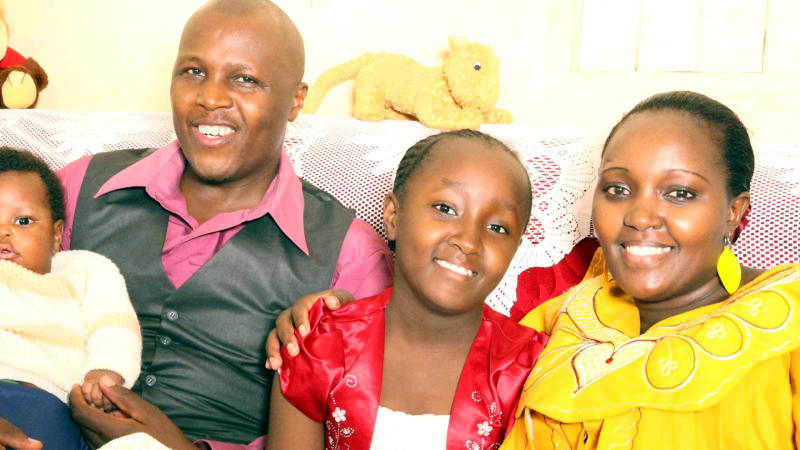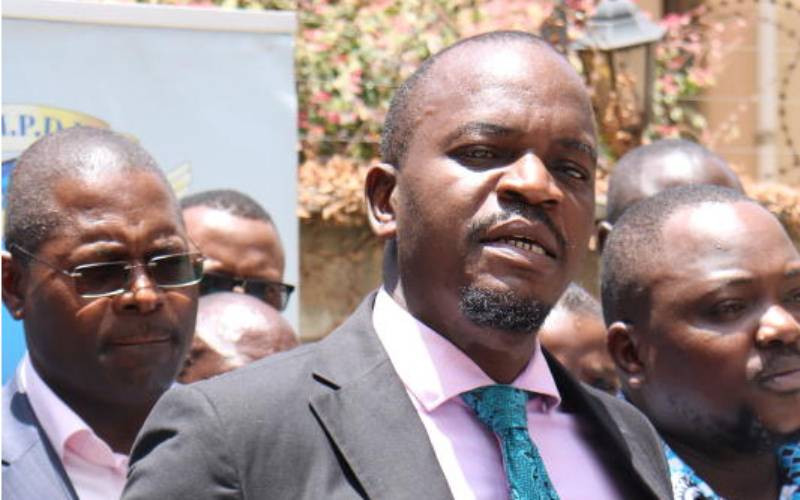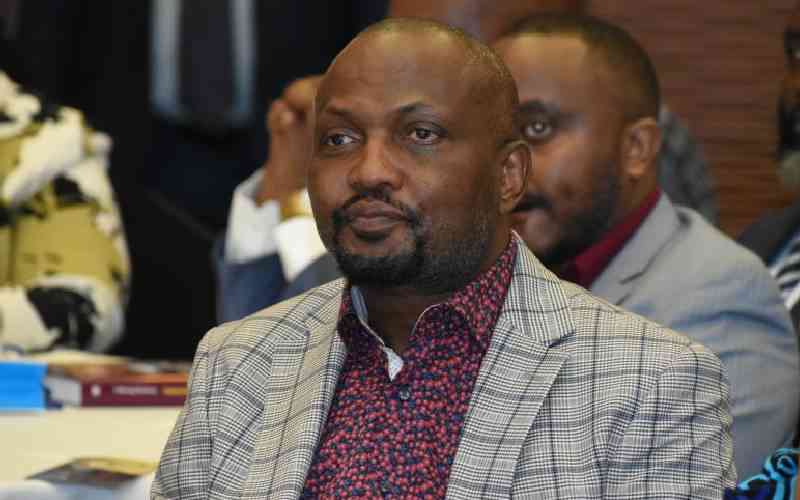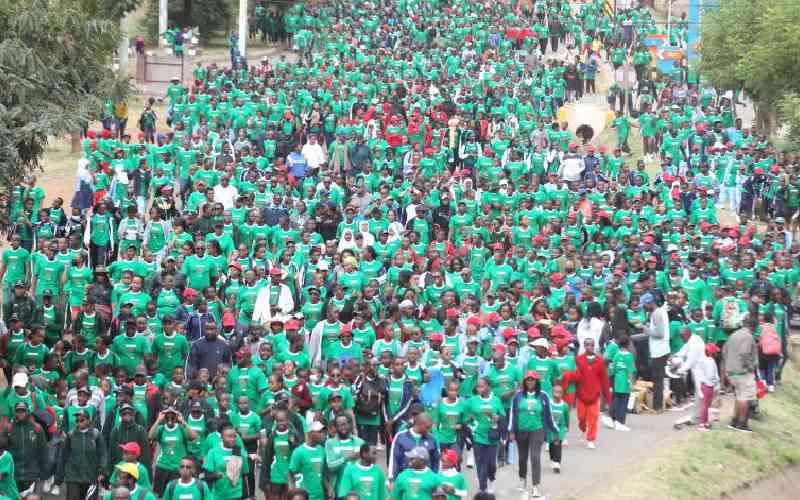
After two months of hospital visits for his daughter’s persistent fever, Julius Ndirangu sought services at a ‘better’ hospital.
‘Better’ because the village clinic in Kameo, Embu County, where Winfred Wacuka, the nine-year-old, was being seen had been prescribing antibiotics that did not seem to be working.
“For about two months the fever was not going away. I was getting worried. I made a decision to take her to Embu Level 5 Hospital,” Mr Ndirangu said.
Tests at the hospital were inconclusive and the patient was referred to Karira Mission Hospital in Mwea.
An X-ray at Karira also failed to yield much information. The doctor asked Ndirangu to visit Gertrude’s Children’s Hospital in Nairobi.
“The doctor insisted that we waste no time,” Ndirangu said, “and so we left for Gertrude’s.”
At the hospital, many tests were done. They cost Sh20,000. The following day, Ndirangu paid a further Sh50,000 “for her admission to the hospital,” he said.
Family and friends
To raise the money, Ndirangu sought help from family and friends. He said he was financially down afterwards. “I had no money left,” he said.
When the doctor presented the diagnosis he was shocked. “The doctor said my daughter had leukaemia (blood cancer). She needed immediate care,” he said.
Ndirangu did not that know that cancer affected children”. “Where did she get it from?” he asked the doctor.
He knew that cancer was expensive to treat. “At least a million shillings,” he thought.
His was confused. Where was he going to get the money? Already, Gertrude’s had told him his NHIF card (for his job group H in the civil service) could not pay for the child’s treatment.
As the head chef at the Kenya School of Government in Embu, his gross salary was Sh18,000. He received Sh9,000 after the deductions.
Wacuka started chemotherapy. About a week later Ndirangu got a bill of Sh700,000. He was told treatment would stop until he paid the money.
Gross salary
“Sh700,000 in one week?” he wondered. His heart sank.
Ndirangu rushed to the NHIF headquarters in Upper Hill, Nairobi.
“I went to see the management. After consultations, the CEO ordered that NHIF pay the bill.
The CEO signed a letter committing NHIF to pay the cost of my daughter’s treatment. I took the letter back to the hospital and the treatment was continued.”
NHIF asked Ndirangu to consider moving his daughter to Kenyatta National Hospital (KNH), where chemotherapy was cheaper.
By that time the bill had jumped to about Sh2 million – which NHIF paid. The bill at KNH was about Sh200, 000 by the time the chemotherapy was over.
Ndirangu was relieved. Treatment was over and the cancer was gone… right? Wrong.
“A haematologist at KNH advised me to get an MRD (minimal residual disease) test done to find out if the cancer was still there,” he says.
Another challenge: MRD tests are not available in Kenya. India, the doctor told Ndirangu, would be a good alternative for the test.
What followed was a series of fundraisings. NHIF agreed to pay for Wacuka’s air tickets as well as the costs arising from medical procedures.
Return tickets for Ndirangu and his wife cost Sh102,000.
“NHIF had given us several hospital options in India. We had picked Max Super Speciality Hospital in New Delhi. When we arrived and the test was done the doctors found that not only had the cancer not gone, it was recurring aggressively.” Ndirangu called NHIF to tell the managers the news.
The hospital said Wacuka needed a bone marrow transplant. The full range of tests, procedures, counter-tests, treatment and transplantation surgery would cost $70,000 (about Sh7 million at the time).
To the family’s relief, NHIF agreed to pay the money since Ndirangu was comprehensively covered.
With finances for the treatment available Ndirangu only needed money for hotel room and upkeep for him and his wife as they followed their daughter’s treatment process. Doctors at the hospital told him Wacuka would need to be at the hospital for at least seven months.
Friends and family back home contributed and fundraised. Wellwishers chipped in.
For four months Ndirangu and his wife paid Sh5, 000 a day for the hotel. This amounted to about Sh600, 000. The last three months the couple lived at the hospital where accommodation was free.
After two months of searching for a donor, the date set for the transplant surgery passed.
Ndirangu said: “The hospital was looking for bone marrow donors who matched my daughter but they didn’t find any. Her sibling didn’t match. Other relatives didn’t match. A bone marrow bank in Germany didn’t have a match. They then asked that one of us (my wife and I) should be the donor. It was the last option we had. However, they warned us that the parent-to-child donor option was more risky and had a 30 per cent chance of death. But what other choice did we have left?”
Ndirangu agreed with his wife that he should be the donor. The surgery was done and Wacuka put under surveillance.
“Doctors in India are thorough. They conducted almost daily tests and monitored Wacuka’s progress nearly every minute,” Ndirangu said.
Sweet news
Two months after the transplant, another MRD test was done. It was the good news that the Ndirangus had been praying for. Wacuka was in remission and was no longer producing cancerous cells.
But they couldn’t however leave for Kenya yet. For three more months Wacuka would need daily tests and a monthly MRD test. All this time she was booked as an inpatient.
In the seventh month of their stay in India, the final test showed that Wacuka was cancer-free and did not need to continue staying at the hospital.
The family was allowed to travel back home. The child would continue taking medicine for a few more months. Wacuka went back to India after three months for a final check-up. Tests showed that the cancer had not recurred and Wacuka was healthy.
It has been four years since Wacuka was declared cancer-free. She first fell ill in 2013. She is 13 years old and will sit for KCPE at the end of the year.
“This experience has taught me to respect people even if you don’t know them. Those who contributed money and helped are largely unknown to us,” Ndirangu says.
He recalls Wacuka’s first week at Gertrude’s Hospital. “The doctor had advised that she receive five units of platelets every day. We needed people to donate blood from where the platelets would be derived. Eighty people – family and friends and their friends – came and donated blood in one week.”
His wife, Helen Gathoni, cannot express her gratitude to God enough, recognising that her daughter survived cancer when all odds were stacked against her.
 The Standard Group Plc is a multi-media organization with investments in media platforms spanning newspaper print
operations, television, radio broadcasting, digital and online services. The Standard Group is recognized as a
leading multi-media house in Kenya with a key influence in matters of national and international interest.
The Standard Group Plc is a multi-media organization with investments in media platforms spanning newspaper print
operations, television, radio broadcasting, digital and online services. The Standard Group is recognized as a
leading multi-media house in Kenya with a key influence in matters of national and international interest.











